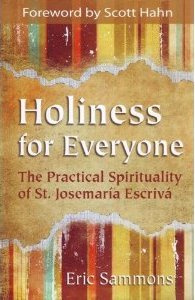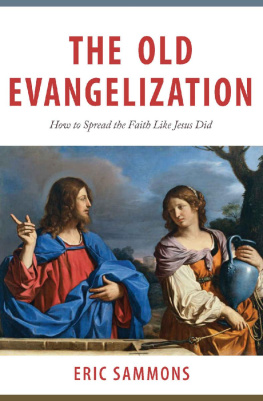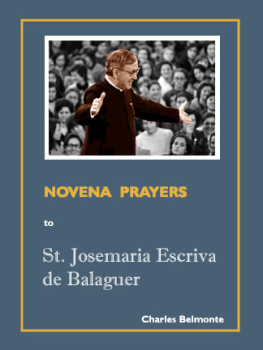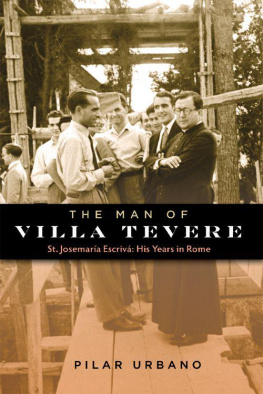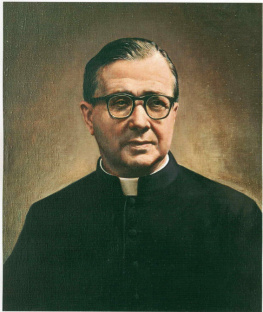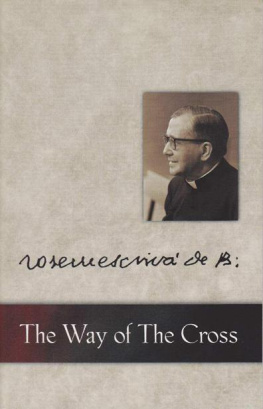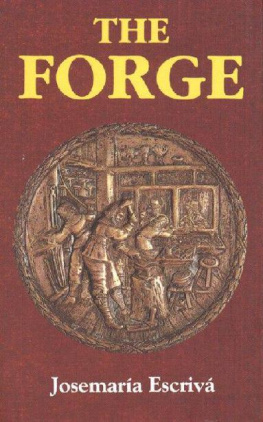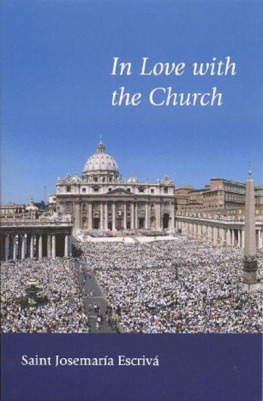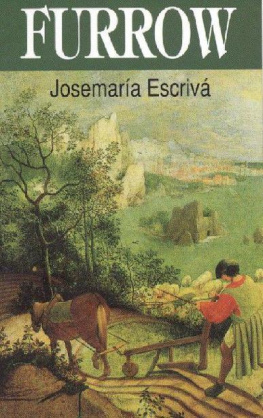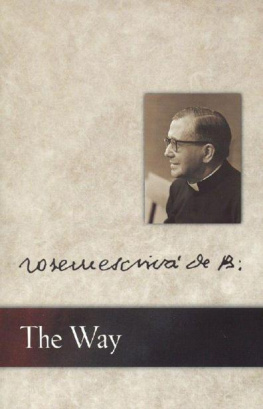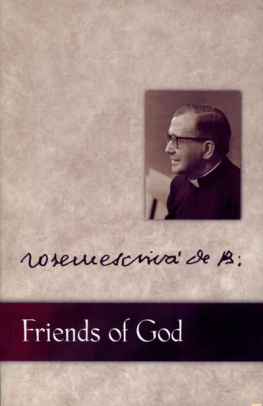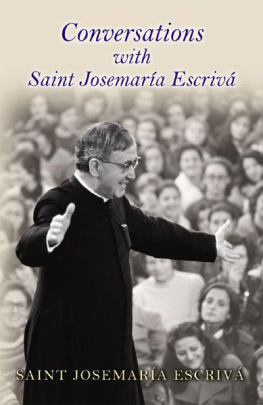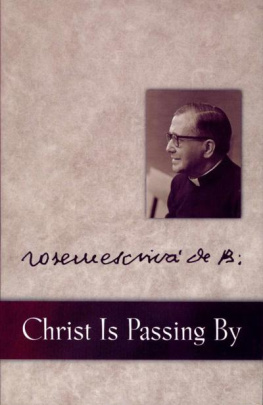HOLINESS FOR EVERYONE
ThePractical Spirituality of St. Josemara Escriv
Eric Sammons

Our Sunday Visitor
Publishing Division
Our Sunday Visitor, Inc. Huntington, IN 46750
Nihil Obstat:
Msgr. Michael Heintz, Ph.D. Censor Librorum
Imprimatur:
+ Kevin C. Rhoades
Bishop of Fort Wayne-South Bend
March 19, 2012
The Nihil Obstat and Imprimatur are declarations that a work isfree from doctrinal or moral error. It is not implied that those who havegranted the Nihil Obstat and Imprimatur agree with the contents, opinions, orstatements expressed.
Unless otherwise noted, the Scripture citations used in this workare taken from the Second Catholic Edition of the Revised Standard Version ofthe Bible (RSV), copyright 1965, 1966, and 2006 by the Division of ChristianEducation of the National Council of the Churches of Christ in the UnitedStates of America. Used by permission. All rights reserved.
Scripture texts marked NAB are taken from the New American Bible,revised edition 2010, 1991, 1986, 1970 Confraternity of Christian Doctrine,Washington, D.C., and are used by permission of the copyright owner. All rightsreserved. No part of the New American Bible may be reproduced in any formwithout permission in writing from the copyright owner.
Every reasonable effort has been made to determine copyrightholders of excerpted materials and to secure permissions as needed. If anycopyrighted materials have been inadvertently used in this work without propercredit being given in one form or another, please notify Our Sunday Visitor inwriting so that future printings of this work may be corrected accordingly.
Copyright 2012 by Eric Sammons. Published 2012.
17 16 15 14 13 12 1 2 3 4 5 6 7 8 9
All rights reserved. With the exception of short excerpts forcritical reviews, no part of this work may be reproduced or transmitted in anyform or by any means whatsoever without permission in writing from thepublisher. Contact: Our Sunday Visitor Publishing Division, Our Sunday Visitor,Inc., 200 Noll Plaza, Huntington, IN 46750; bookpermissions@osv.com; or1-800-348-2440.
ISBN: 978-1-59276-944-5 (Inventory N0.T1153) eISBN:978-1-61278-221-8 LCCN: 2012934467
Interior design by M. Urgo
Cover design by Rebecca J. Heaston Cover image by Shutterstock
For Fr. Scott Woods,who first convinced me that holiness was truly possible.
READ,MEDITATE, PRAY, CONTEMPLATE
Atthe end of each chapter is a section called "Read, Meditate, Pray, Contemplate."These ideas for further thought and reading will help you deepen your knowledgeand understanding of the chapters topics. Each of these sections begins with arecommendation for additional reading, such as a chapter from one of the worksof St. Josemara Escriv. These works are all available for free online. Findthe writings of St. Josemara at www.escrivaworks.org. Go to the website, clickon the name of the book, click on "Table of Contents," and then click"View Chapter" next to the referenced chapter.
CONTENTS
Foreword
Lifehas taught me that a family is not simply a household and its inhabitants. Mywife, Kimberly, and I have watched our children grow; and now they've begun tomarry and have children of their own, make homes of their own. Each of theirhomes has a style all its own, though I'm pleased to recognize so many of thecustoms they received from their mom and dad.
Afamily, when it's functional, is really a family of families each constituentgroup a little different from all the others, but all holding on to some commoninheritance. It makes for rollicking conversation at holidays and reunions. Itmakes for unforgettable holidays and vacations.
TheChurch, too, is a family of families. We have dioceses and parishes, movementsand religious orders, eastern rites and western, sodalities, and even militaryorders each a little different from the others, but all holding on to thesame apostolic tradition, all of them Catholic.
Myfamily within the family is called Opus Dei (Latin for "The Work ofGod"), which was founded by St. Josemara Escriv in 1928. The teachingsof that saint are the subject of this wonderful book by Eric Sammons. I myselfhave written a book about "The Work." It's titled Ordinary Work, ExtraordinaryGrace: My Journey in Opus Dei, and it's a personal account, aninsider's view, though addressed to anyone who might be interested or curious.
Icould not have written a book like Eric's. Perhaps I could not have written abook as useful as Eric's, for he sees my family inheritance from a differentperspective. He is not a member of Opus Dei though he has studied its spiritand learned from it and so he sees it from the outside. Sometimes that meanshe sees it more clearly and more attentively and more appreciatively. He hashelped me to gain a better appreciation for the family life to which God hascalled me.
Ericknows that the heart of family life is the parent-child bond. In natural families,that heart is not always healthy. In no natural family is it perfect. But theheart of Opus Dei is something greater. Opus Dei draws its life from the factof divinefiliation the fact that all Christians become children of Godthrough baptism. That doctrine took hold of St. Josemara Escriv as Godinspired him to spell out what it means for children of God to live in amaterial world.
Yetthe idea was not original with St. Josemara, and it is not the privateproperty of Opus Dei. It is the common tradition of the Catholic Church. In theCatholic view, we are not merely saved from something, but for something. We are saved from sin, but for sonship. So freed, we may enjoy "the glorious liberty of the children ofGod" (Rom 8:21). St. Paul wrote: "All who are led by the Spirit ofGod are sons of God. For you did not receive the spirit of slavery to fall backinto fear, but you have received the spirit of sonship. When we cry 'Abba!Father!' it is the Spirit himself bearing witness with our spirit that we arechildren of God" (Rom 8:14-16).
"Seewhat love the Father has given us, that we should be called children of God;and so we are.... Beloved, we are God's children now" (1 Jn 3:1-2).
Ourshare in Christ's sonship is not our work, but the work of God. It is theessence of our salvation as well as the defining feature of Opus Dei.
EricSammons shows that St. Josemara has recovered the most powerful truth ofclassic Christianity and restated it in a way that is compelling for men andwomen (and children) of our time.
And since he hasbeen canonized a saint, his teaching now belongs not only to his "familywithin the family," but to the great family. Opus Dei as a way ofsanctification in the world, a way to sanctify our ordinary work belongs tothe Church, belongs to everybody.
Scott Hahn
Introduction
What is yourgoal in life?
WhenI was a kid, I wanted to be a baseball player, a fireman, and a super-hero. AsI got older, my goals became more modest: have a happy family and be able toprovide for them. Such goals are not uncommon today
Whatis God's goal for your life?
Itmight surprise you to know that God's goal for you is nothing less than sainthood.St. Paul wrote, "For this is the will of God, your sanctification" (1Thess 4:3). And what is "sanctification"? It is the perfecting of ourminds and wills so that they are more and more like God's. In other words, Godwants us to be like him! This becoming more and more Godlike is what saintssuch as St. Francis of Assisi and St. Therese of Lisieux did in their lives,and it is what God wants and expects from each of us.
Buthow do we become a saint, especially in the modern world, which constantlypushes us away from sanctity? Fortunately for us, there was a twentieth-centurypriest who was devoted to answering this question and we should listen tohim, for he was canonized a saint. Who is this priest and saint? JosemaraEscriv, the founder of Opus Dei.
Next page
